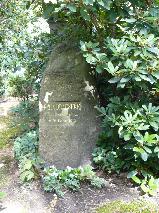Draeseke, Felix August Bernhard |
| COMPOSER (GERMANY) |
|
BORN 7 Oct 1835, Coburg, Bayern - DIED 26 Feb 1913, Dresden, Sachsen CAUSE OF DEATH Stroke GRAVE LOCATION Dresden, Sachsen: Städtische Friedhof und Urnenhain Tolkewitz, Wehlener Strasse |
|
Felix Draeseke was a proponent of the New German School after he attended an early performance of Wagner's "Lohengrin". He studied in Leipzig, but he met Hans von Bülow in 1853 in Berlin. In 1856 "Der Dichter und der Componist" ("The Poet and the Composer"), his first essay on Wagner, was published. From 1856 to 1861 he lived in Weimar, where Liszt had his music school. He visited Wagner for a month in 1859 in Tribschen and witnessed Wagner finishing "Tristan and Isolde". In 1862 he left Germany for Switzerland and he worked as a teacher near Lausanne. He attended the premiere of "Tristan and Isolde" in Munich in 1865. He returned to Germany in 1876 and settled in Dresden. It wasn't before 1884 that he obtained a permanent position at the conservatory in Dresden. He became a professor there in 1892. In 1894 he married his former pupil Frida Neuhaus (they had first met in 1882). In 1905 he sharply attacked "Salome" by Richard Strauss although Strauss was influenced by Draeseke's music. In 1912 he finished his fourth symphony. He continued declaring that Wagner was the greatest mind that he ever met until he died in 1913 after suffering a stroke. In 1935 festivals were held in Coburg in honour of his 100th birthday. His widow Frieda died on 14 Nov 1942. Related persons • knew Bülow, Hans von • admired Liszt, Franz • criticized Strauss, Richard • admired Wagner, Richard • visited Wagner, Richard |
| Images |



